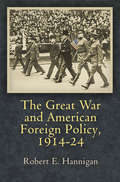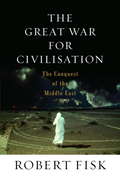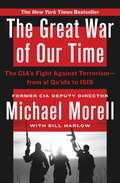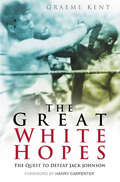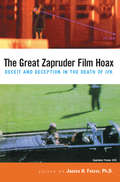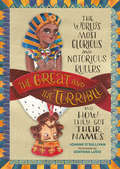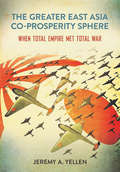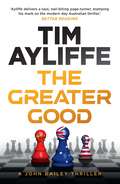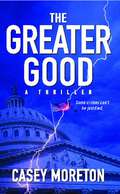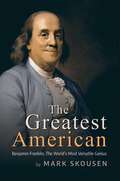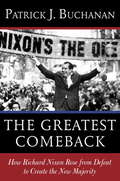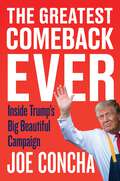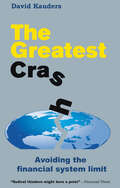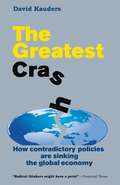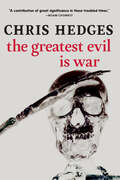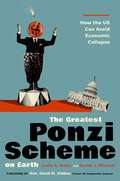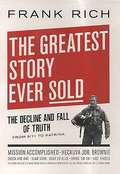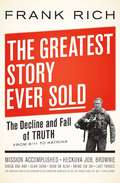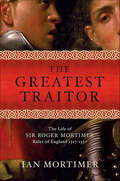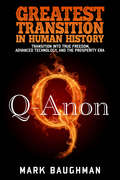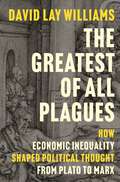- Table View
- List View
The Great War and American Foreign Policy, 1914-24
by Robert E. HanniganWorld War I constituted a milestone in the development of the United States as a world power. As the European powers exhausted themselves during the conflict, the U.S. government deployed its growing economic leverage, its military might, and its diplomacy to shape the outcome of the war and to influence the future of international relations.In The Great War and American Foreign Policy, 1914-1924, Robert E. Hannigan challenges the conventional belief that the United States entered World War I only because its hand was forced, and he disputes the claim that Washington was subsequently driven by a desire to make the world "safe for democracy." Democratic President Woodrow Wilson's rhetoric emphasized peace, self-determination, and international cooperation. But his foreign policy, Hannigan claims, is better understood if analyzed against the backdrop of American policy--not only toward Europe, but also toward East Asia and the rest of the western hemisphere--as it had been developing since the turn of the twentieth century. On the broadest level, Wilson sought to shore up and stabilize an international order promoted and presided over by London since the early 1800s, this in the conviction that under such conditions the United States would inevitably ascend to a global position comparable to, if not eclipsing, that of Great Britain. Hannigan argues, moreover, that these fundamental objectives continued to guide Wilson's Republican successors in their efforts to stabilize the postwar world.The book reexamines the years when the United States was ostensibly neutral (1914-17), the subsequent period of American military involvement (1917-18), the Paris Peace Conference of 1919, the ensuing battle for ratification of the Treaty of Versailles (in 1919-20), and the activities of Wilson's successors--culminating with the Dawes Plan of 1924.
The Great War and the Origins of Humanitarianism, 1918-1924
by Bruno CabanesThe aftermath of the Great War brought the most troubled peacetime the world had ever seen. Survivors of the war were not only the soldiers who fought, the wounded in mind and body. They were also the stateless, the children who suffered war s consequences, and later the victims of the great Russian famine of 1921 to 1923. Before the phrases universal human rights and non-governmental organization even existed, five remarkable men and women - Rene Cassin and Albert Thomas from France, Fridtjof Nansen from Norway, Herbert Hoover from the US and Eglantyne Jebb from Britain - understood that a new type of transnational organization was needed to face problems that respected no national boundaries or rivalries. Bruno Cabanes, a pioneer in the study of the aftermath of war, shows, through his vivid and revelatory history of individuals, organizations, and nations in crisis, how and when the right to human dignity first became inalienable.
The Great War for Civilisation
by Robert FiskA sweeping and dramatic history of the last half century of conflict in the Middle East from an award-winning journalist who has covered the region for over thirty years, The Great War for Civilisation unflinchingly chronicles the tragedy of the region from the Algerian Civil War to the Iranian Revolution; from the American hostage crisis in Beirut to the Iran-Iraq War; from the 1991 Gulf War to the American invasion of Iraq in 2003. A book of searing drama as well as lucid, incisive analysis, The Great War for Civilisation is a work of major importance for today's world.From the Trade Paperback edition.
The Great War in History
by Jay Winter Antoine ProstThis is the first major study of German attitudes towsrds England during the Great War, 1914–1918, continuing the story of Anglo-German antagonism where previous studies have ended. In particular it focuses on the extremity of anti-English feeling in Germany in the early years of the war, and on the attempt by writers, propagandists and cartoonists to redefine Britain as the chief enemy of the German people and their cultural heritage. New material is also offered concerning the development of an extreme rightist network in Munich and Berlin during the war years, which used anti-English feeling as a focus for attacking the supposedly defeatist government of Chancellor Bethmann-Hollweg. Such views formed the background to the disastrous decision to begin unrestricted submarine warfare against England in January 1917; and they also contributed to the ideological polarization of German politics at a crucial juncture in European and world history.
The Great War of Our Time: The CIA's Fight Against Terrorism--From al Qa'ida to ISIS
by Bill Harlow Michael MorellNew York Times Bestseller Like See No Evil and At the Center of the Storm, this is a vivid and gripping account of the Central Intelligence Agency, a life of secrets, and a war in the shadows. Called the "Bob Gates of his generation" by Politico, Michael Morell was a top CIA officer who played a critical role in the most important counterterrorism events of the past two decades. Morell was by President Bush's side on 9/11/01 when terrorists struck America and in the White House Situation Room advising President Obama on 5/1/11 when America struck back-killing Usama bin Ladin. From the subway bombings in London to the terrorist attacks in Benghazi, Morell always seemed to find himself on the cusp of history. A superb intelligence analyst and briefer, Morell now presents THE GREAT WAR OF OUR TIME, where he uses his talents to offer an unblinking and insightful assessment of CIA's counterterrorism successes and failures of the past twenty years and, perhaps most important, shows readers that the threat of terrorism did not die with Bin Ladin in Abbottabad. Morell illuminates new, growing threats from terrorist groups that, if unaddressed, could leave the country vulnerable to attacks that would dwarf 9/11 in magnitude. He writes of secret, back-channel negotiations he conducted with foreign spymasters and regime leaders in a desperate attempt to secure a peaceful outcome to unrest launched during the "Arab Spring." Morell describes how efforts to throw off the shackles of oppression have too often resulted in broken nation states unable or unwilling to join the fight against terrorism. Along the way Morell provides intimate portraits of the leadership styles of figures ranging from Presidents Bush and Obama, CIA directors Tenet, Goss, Hayden, Petraeus, Panetta, and Brennan, and a host of others.
The Great White Hopes: The Quest to Defeat Jack Johnson
by Graeme Kent Harry CarpenterIn 1908 black fighter Jack Johnson won the heavyweight championship of the world. There was an immediate storm of protest: it was predicted - accurately - that his reign would lead to civic unrest and race riots. Over the next seven years, more than 30 fighters lured by the prospect of fame tried to beat Jackson. This title tells the story.
The Great Zapruder Film Hoax
by Ph.D. James H. FetzerThis is the first book to expose a crucial aspect of the cover-up of the JFK assassination conspiracy: the doctoring of the Zapruder film, allegedly a 27-second home movie shot by Abraham Zapruder in Dealey Plaza. The evidence for alteration of the Zapruder movie takes many forms, including inconsistencies with eyewitness testimony, discrepancies with other films and photographs, impossible movements within the time-frame of the movie, contradictions between the movie and the physical layout of Dealey Plaza, and the multiple versions of the movie itself. This book brings together all the leading authorities within the assassination research community, including David Healy, authority on technical processes of film production; Jack White, who for forty years has made a special study of the JFK assassination movies and photographs; John Costella, Ph.D., a physicist and engineer with a background in optics, the properties of light, and moving objects; and David W. Mantick, Ph.D., the foremost expert on the medical evidence in the JFK assassination.
The Great and the Terrible: The World's Most Glorious and Notorious Rulers and How They Got Their Names
by Joanne O'SullivanThis fun, quirky, and engaging fully illustrated history anthology features twenty-five amazing and terrifying rulers for middle grade readers to discover.We've heard of Alexander the Great. We've heard of Ivan the Terrible. But what was so Great about Alexander? What was so Terrible about Ivan? Spanning centuries of history in a culturally diverse framework-from ancient India to nineteenth-century Hawaii, and with a balanced focus on notorious women rulers as well as male, The Great and the Terrible takes a humorous look at some of the most glorious and notorious figures in history through the lens of the nicknames they're remembered by. While some of the characters mentioned here are more prominent in world history (Cyrus the Great introduced the world's first human rights charter), others are well known only within their own cultures. The Great and the Terrible gives middle-grade readers an opportunity to dip into the breadth of world history, sampling its cultural diversity and its stranger-than-fiction historical exploits, with a mix of the sensational and the serious. It helps to correct the imbalance in many history books that currently only focus on Western Civilization, shining the spotlight on achievements (and foibles) in many different cultures.
The Greater East Asia Co-Prosperity Sphere: When Total Empire Met Total War (Studies of the Weatherhead East Asian Institute, Columbia University)
by Jeremy A. YellenIn The Greater East Asia Co-Prosperity Sphere, Jeremy Yellen exposes the history, politics, and intrigue that characterized the era when Japan's "total empire" met the total war of World War II. He illuminates the ways in which the imperial center and its individual colonies understood the concept of the Sphere, offering two sometimes competing, sometimes complementary, and always intertwined visions—one from Japan, the other from Burma and the Philippines.Yellen argues that, from 1940 to 1945, the Greater East Asia Co-Prosperity Sphere epitomized two concurrent wars for Asia's future: the first was for a new type of empire in Asia, and the second was a political war, waged by nationalist elites in the colonial capitals of Rangoon and Manila. Exploring Japanese visions for international order in the face of an ever-changing geopolitical situation, The Greater East Asia Co-Prosperity Sphere explores wartime Japan's desire to shape and control its imperial future while its colonies attempted to do the same. At Japan's zenith as an imperial power, the Sphere represented a plan for regional domination; by the end of the war, it had been recast as the epitome of cooperative internationalism. In the end, the Sphere could not survive wartime defeat, and Yellen's lucidly written account reveals much about the desires of Japan as an imperial and colonial power, as well as the ways in which the subdued colonies in Burma and the Philippines jockeyed for agency and a say in the future of the region.
The Greater Good (John Bailey #1)
by Tim AyliffeSET TO BE ADAPTED FOR THE SCREEN. Like Michael Connelly&’s Bosch, John Bailey will risk everything to get to the truth – and expose a deadly enemy. There&’s nothing more dangerous than a man who can fall no further … &‘Ayliffe delivers a taut, nail-biting page-turner, stamping his mark on the modern day Australian thriller.&’ Better ReadingHe had never killed anyone who hadn&’t deserved it. The means always justified the end. He didn&’t need forgiveness. He needed justification. The greater good. Battered war correspondent John Bailey is a man living on the edge. He&’s haunted by nightmares of being kidnapped and tortured in Iraq and he&’s drinking too much to drown the memories. As he battles to get his life back together, a story breaks that will force him back into the spotlight – and into the crosshairs of a deadly international player. When a beautiful prostitute is found murdered in her luxury apartment, Bailey is ordered to cover the story by The Journal&’s editor and his old friend, Gerald Summers, because he can&’t trust anyone else. One of the victim&’s clients, a key advisor to the Defence Minister, is chief suspect in her murder and he&’s on the run. When he contacts Bailey, claiming to have information that will bring down the government, the stakes become deadly. To complicate matters, the investigating police detective is the woman Bailey walked out on a decade ago. When a ruthless CIA fixer turns up, followed by a murderous Chinese agent hot on his trail, Bailey realises he has stumbled onto the story of a lifetime – one that he may not live to tell. The brilliant first book in Tim Ayliffe's bestselling John Bailey series. Bailey's adventures in The Greater Good, State of Fear and The Enemy Within will be adapted for the screen by CJZ Productions, Australia's largest independently owned production company.Praise for The Greater Good &‘A brilliantly written character starring in cracking crime thriller&’ Herald Sun &‘A fun and exhilarating political crime thriller that is guaranteed to electrify and entertain in good measure.&’? The Unseen Library &‘Readers will not fail to enjoy the ride from start to finish.&’ Good Reading &‘A crime thriller with the lot: murder, deceit, corruption and a hint of romance … Ayliffe takes you deep inside the worlds of politics and the media, with a heavy dose of international intrigue thrown in.&’ Michael Rowland Ayliffe delivers a taut, nail-biting page-turner, stamping his mark on the modern day Australian thriller.&’ Better Reading &‘If Rake were a journalist, with a talent that equals his capacity to survive being beaten up, Bailey would be him.&’ Julia Baird &‘An absolute cracker of a thriller.&’ Chris UhlmannPraise for State of Fear &‘Another brilliantly crafted thriller from Ayliffe that fits perfectly in today&’s worrying world … Verdict: Get this guy on TV&’ Herald Sun Praise for Enemy Within &‘A breathlessly written book, ripped from today&’s headlines, this is a cracking read that blurs the line between fact and fiction. More please.&’ Michael Robotham 'A cracking yarn told at breakneck speed. I couldn't put it down.' Chris Hammer &‘Sharp, gritty, sophisticated. Ayliffe&’s criminal world is terrifyingly real.&’ Candice Fox
The Greater Good: A Thriller
by Casey MoretonA high-velocity political thriller from a gifted first-time novelist follows the hunt for a videotape that terrifyingly reveals Washington's deadliest secret: the shocking identity of the vice president's assassin. First, there is the bullet -- the bullet fired from the rifle of one of the world's most elusive assassins. Second, there is the body -- the body of the vice president of the United States. Finally, there is the secret, a secret poised to wreak chaos so potent as to bring the highest powers of government to their knees. Welcome to the high-stakes world of The Greater Good, a heart-pounding, lightning-paced suspense novel that boldly marks the arrival of a singular new writing talent, Casey Moreton. Hours before an assassin's bullet rips through his bedroom window, Vice President James Ettinger makes an explosive confession on videotape. When the smoke clears in the aftermath of the assassination, the tape has vanished. And the race is on. From the dizzying heights of Washington insider power to the subterranean realm of win-at-all-costs political maneuvering, the quest to find the mysterious videotape snatches readers up in a relentless whirlwind of espionage, brutal policy warfare, and the intricate machinations of no-holds-barred power brokering. Only one thing is clear: those responsible for Ettinger's death will stop at nothing to make sure his final words are never heard. Putting his crew of engaging, multidimensional characters through their paces as they negotiate a treacherous political maze, novelist Casey Moreton proves himself a natural storyteller with seemingly unlimited surprises up his sleeve.
The Greatest American: Benjamin Franklin, The World's Most Versatile Genius
by Mark Skousen&“I have sometimes almost wished it had been my destiny to have been born two or three centuries hence.&” -- Ben FranklinWas Benjamin Franklin an indispensable public servant or a cunning chameleon? A hard-headed entrepreneur or an opportunistic privateer? A devoted family man or a notorious womanizer? A scientist and inventor or a hoaxer and self promoter? A believer or a heretic? The first civilized American or the most dangerous man in America? Read this book, and you decide! In The Greatest American, Dr. Mark Skousen—&“America&’s Economist&” and a direct descendant of the old man—reveals many new features and little-known facts about Ben Franklin, such as: - Why Franklin was a free trader: "No nation was ever ruined by trade." - The surprising benefits of inflation to pay for the American Revolution. - How the War of Independence transformed him from a religious heretic to a believing theist. - Why he hated party politics. - How he changed his mind about slavery and became a devote abolitionist. - The truth about his love affairs with women. Did he really abandon his wife Deborah, or did she abandon him? - Why he never applied for any patents for his famous inventions. - Why George Washington loved Franklin and John Adams despised him. - Why he turned against his beloved son, William, and never forgave him. - His preference for private welfare and charities rather than state-run social programs and welfare. Benjamin Franklin was the oldest of the founding fathers -- he was indeed a whole generation ahead of George Washington, John Adams and Thomas Jefferson -- and yet he was the most forward-looking of the group and the most modern of the founders. The Greatest American shows just how much of an impact Benjamin Franklin had on American politics and daily life. &“Few scholars today know Benjamin Franklin as well, or as intimately, as Mark Skousen. That familiarity is on full display in The Greatest American. Skousen, a direct descendant of his subject, ranges nimbly across the remarkable breadth of Franklin&’s life, from his views on business and economics to education and, yes, sex. Along the way, he makes a com- pelling case not only for Franklin&’s greatness but also for his relevance today. He is the most modern of founders—and the most fun.&” —Eric Weiner, author, Ben and Me, and former foreign correspondent for NPR &“Mark Skousen lucidly, delightfully and successfully lays out the life of one the most extraordinary figures in American— and indeed world—history. Franklin personified and promoted the characteristics and culture that made America great, especially the drive for self-improvement and inventiveness. His genius for diplomacy was absolutely essential for the success of the American Revolution. The significance of his astonishing scientific achievements, insights, and research are only now being fully appreciated. One can only exclaim: What a man!&” —Steve Forbes, chairman and editor in chief, Forbes magazine &“If anyone embodies the Renaissance man, it&’s Ben Franklin— printer, scientist, musician, inventor, author, activist, statesman, and diplomat. Mark Skousen delves into every facet of his remarkable life, including Franklin&’s surprisingly active love life into his eighties, in this lively and entertaining book. Highly recommended!&” —Alexander Green, chief investment strategist, The Oxford Club, and author of Beyond Wealth
The Greatest Comeback
by Patrick J. BuchananPatrick J. Buchanan, bestselling author and senior advisor to Richard Nixon, tells the definitive story of Nixon's resurrection from the political graveyard and his rise to the presidency. After suffering stinging defeats in the 1960 presidential election against John F. Kennedy, and in the 1962 California gubernatorial election, Nixon's career was declared dead by Washington press and politicians alike. Yet on January 20, 1969, just six years after he had said his political life was over, Nixon would stand taking the oath of office as 37th President of the United States. How did Richard Nixon resurrect a ruined career and reunite a shattered and fractured Republican Party to capture the White House? In The Greatest Comeback, Patrick J. Buchanan--who, beginning in January 1966, served as one of two staff members to Nixon, and would become a senior advisor in the White House after 1968--gives a firsthand account of those crucial years in which Nixon reversed his political fortunes during a decade marked by civil rights protests, social revolution, The Vietnam War, the assassinations of JFK, RFK, and Martin Luther King, urban riots, campus anarchy, and the rise of the New Left. Using over 1,000 of his own personal memos to Nixon, with Nixon's scribbled replies back, Buchanan gives readers an insider's view as Nixon gathers the warring factions of the Republican party--from the conservative base of Barry Goldwater to the liberal wing of Nelson Rockefeller and George Romney, to the New Right legions of an ascendant Ronald Reagan--into the victorious coalition that won him the White House. How Richard Nixon united the party behind him may offer insights into how the Republican Party today can bring together its warring factions. The Greatest Comeback is an intimate portrayal of the 37th President and a fascinating fly on-the-wall account of one of the most remarkable American political stories of the 20th century.
The Greatest Comeback Ever: Inside Trump's Big Beautiful Campaign
by Joe ConchaVIBE SHIFT! National Bestselling author Joe Concha hip checks the mainstream media to deliver the juicy truth about this important moment in history. <p> Lawfare. Assassination attempts. Kamala’s coronation. Nearly $3 billion in campaign cash. Liberals were so scared of Trump that they threw everything they had at him. They're even more scared now. <p> In The Greatest Comeback Ever, Concha roasts the wildest anti-Trump flops from the prediction race. Walz and Biden swore they were the happy-go-lucky crew, but Trump was the one dancing his way to the YMCA while Kamala screeched about the end of days. She stumbled over unburdening her past while Trump nailed it on groceries and borders—stuff folks actually care about. Tons of books will miss the mark because they're written by clueless hacks who didn’t see Trump coming, but Concha’s got the real scoop: <b> Who is responsible for the Democrats’ utter collapse. <b> How the Republicans took the winning side on every key issue. <b> Why the media stepped on every rake. <b> How Trump sailed into office ready for the most consequential second term ever. <p> It’s no wonder the American people chose to reelect him. Everyone should have seen it coming. The Greatest Comeback Ever illustrates how Trump pulled off the art of the comeback—in the biggest, most beautiful, most terrific campaign of the century. <b>New York Times Bestseller</b>
The Greatest Crash: Avoiding the financial system limit
by David Kauders"Radical thinkers might have a point" - Financial Times The Greatest Crash argues that the financial system which evolved from the early Italian bankers has now reached a roadblock. The weight of debt already created prevents further economic expansion, while paying down the debt shrinks economies. To escape this trap, evolution is needed. But bureaucratic design, delegated government, and group think, all combine to prevent evolution.
The Greatest Crash: How Contradictory Policies Are Sinking The Global Economy
by David Kauders"Radical thinkers might have a point" - Financial Times The Greatest Crash argues that the financial system which evolved from the early Italian bankers has now reached a roadblock. The weight of debt already created prevents further economic expansion, while paying down the debt shrinks economies. To escape this trap, evolution is needed. But bureaucratic design, delegated government, and group think, all combine to prevent evolution.
The Greatest Evil is War
by Chris HedgesAn unflinching indictment of the horror and obscenity of war by one of our finest war correspondents.Drawn from experience and interviews by Pulitzer-prize-winner Chris Hedges, this book looks at the hidden costs of war, what it does to individuals, families, communities and nations.In fifteen short chapters, Chris Hedges astonishes us with his clear and cogent argument against war, not on philosophical grounds or through moral arguments, but in an irrefutable stream of personal encounters with the victims of war, from veterans and parents to gravely wounded American serviceman who served in the Iraq War, to survivors of the Holocaust, to soldiers in the Falklands War, among others. Hedges reported from Sarajevo, and was in the Balkans to witness the collapse of the Soviet Union. In 2002 he published War Is a Force that Gives Us Meaning, which the Los Angeles Times described as &“the best kind of war journalism… bitterly poetic and ruthlessly philosophical&” and the New York Times called &“a brilliant, thoughtful, timely, and unsettling book.&” In the twenty years since, Hedges has not wanted to write another book on the subject of war—until now, with the outbreak of war in Ukraine. It is important again to be reminded who are the victors of the spoils of war and of other unerring truths, not only in this war but in all modern wars, where civilians are always the main victims, and the tools and methods of war are capable of so much destruction it boggles the mind. This book is an unflinching indictment of the horror and obscenity of war by one of our finest war correspondents.
The Greatest Ponzi Scheme on Earth: How the US Can Avoid Economic Collapse
by Daniel J. Mitchell Les A. RubinIn The Greatest Ponzi Scheme on Earth, economist Dan Mitchell and entrepreneur Les Rubin give an in-depth look at how the US is headed toward a fiscal collapse if we do not course-correct and get government spending under control. Is the United States government running a Ponzi scheme? We have a massive federal debt because there is too much spending in Washington. Rather than try to solve our fiscal problems, however, politicians think the answer is to borrow more money. Sounds like a Ponzi scheme to us. In The Greatest Ponzi Scheme on Earth, economist Dan Mitchell and entrepreneur Les Rubin make the case that we, the American public, are being swindled by a federal government whose never-ending, out-of-control cycle of wasteful spending is putting our economic stability in grave peril. For the sake of our children&’s children and the future of our country, it is time for us to pull in the reins and end the spend. What would happen if the world&’s greatest economic powerhouse went bankrupt? Through real-world examples from home and abroad, Mitchell and Rubin take us on a crash course in economics, history, fiscal reality, and (most importantly) tried-and-true solutions. How do we fix Social Security, Medicare, and Medicaid? What kind of tax burden can the economy bear and still thrive? And what can I do about it? These questions should be on the mind of every American—and they are the beating heart of this book. Learn economics, get mad, and vote for fiscal responsibility. If you&’re looking for a place to start, look no further. The important thing is that you start now. Your children&’s children depend on it.
The Greatest Story Ever Sold
by Frank RichWhen America was attacked on 9/11, its citizens almost unanimously rallied behind its new, untested president as he went to war. What they didn't know at the time was that the Bush administration's highest priority was not to vanquish Al Qaeda but to consolidate its own power at any cost. It was a mission that could be accomplished only by a propaganda presidency in which reality was steadily replaced by a scenario of the White House's own invention—and such was that scenario's devious brilliance that it fashioned a second war against an enemy that did not attack America on 9/11, intimidated the Democrats into incoherence and impotence, and turned a presidential election into an irrelevant referendum on macho imagery and same-sex marriage. As only he can, acclaimed New York Times columnist Frank Rich delivers a step-by-step chronicle of how skillfully the White House built its house of cards and how the institutions that should have exposed these fictions, the mainstream news media, were too often left powerless by the administration's relentless attack machine, their own post-9/11 timidity, and an unending parade of self-inflicted scandals (typified by those at The New York Times). Demonstrating the candor and conviction that have made him one of our most trusted and incisive public voices, Rich brilliantly and meticulously illuminates the White House's disturbing love affair with "truthiness," and the ways in which a bungled war, a seemingly obscure Washington leak, and a devastating hurricane at long last revealed the man-behind-the-curtain and the story that had so effectively been sold to the nation, as god-given patriotic fact. .
The Greatest Story Ever Sold: The Decline and Fall of Truth From 9/11 to Katrina
by Frank RichA step-by-step account of how skillfully the White House has built its house of cards, to consolidate its power at any cost.
The Greatest Traitor: The Life of Sir Roger Mortimer, Ruler of England 1327–1330
by Ian Mortimer“A compelling page-turner” about the medieval English baron who invaded his own country and deposed a king (Alison Weir, New York Times–bestselling author of Queen Isabella).One night in August 1323, a captive rebel baron, Sir Roger Mortimer, drugged his guards and escaped from the Tower of London. With the king’s men-at-arms in pursuit he fled to the south coast and sailed to France. There he was joined by Isabella, the French-born queen of England, who threw herself into his arms. A year later, as lovers, they returned with an invading army: King Edward II’s forces crumbled before them and Mortimer took power. He removed Edward II in the first deposition of a monarch in British history. Then the ex-king was apparently murdered, some said with a red-hot poker, in Berkeley Castle.Brutal, intelligent, passionate, profligate, imaginative, and violent, Sir Roger Mortimer was an extraordinary character. It is not surprising that the queen lost her heart to him. Nor is it surprising that his contemporaries were terrified of him. But until now no one has appreciated the full evil genius of the man. This first biography reveals not only Mortimer’s career as a feudal lord, a governor of Ireland, a rebel leader, and a dictator of England, but also the truth of what happened that night in Berkeley Castle.“A fast-paced and entertaining narrative.” —Publishers Weekly“Some terrific detective work.” —The New York Times Book Review“The most remarkable medieval historian of our time.” —The Times
The Greatest Transition In Human History: Transition into True Freedom, Advanced Technology, and The Prosperity Era
by Mark BaughmanKnowledge is power. Real truth is freedom. Freedom is what our Founding Fathers wanted to create as the beacon of light to the world in 1776. America was to be the example of what humanity could be. Was that really achieved? The Greatest Transition in Human History tells the real story of America over the past over 200 years - the heartbreak, false-flag wars, hidden technology, power, corruption, and manipulation. Does the American citizen have real Freedom as the great Constitution and Bill of Rights intended? The Greatest Transition in Human History is the real emotion story of great Americans and patriots standing up for these great rights. These freedoms were taken for granted by so many - for many fell asleep and did not participate as much as we should have, including myself for many years. No more, for I work for humanity, and freedom. I want that real Freedom Bell to ring for all. For in the oath to a military person sworn in to our armed forces, they are to fight any enemy both foreign and domestic. The Greatest Transition in Human History is the story of brave people standing up for individual freedoms and rights worldwide, in the Greatest Secret War ever.
The Greatest of All Plagues: How Economic Inequality Shaped Political Thought from Plato to Marx
by David Lay WilliamsHow the great political thinkers have persistently warned against the dangers of economic inequalityEconomic inequality is one of the most daunting challenges of our time, with public debate often turning to questions of whether it is an inevitable outcome of economic systems and what, if anything, can be done about it. But why, exactly, should inequality worry us? The Greatest of All Plagues demonstrates that this underlying question has been a central preoccupation of some of the most eminent political thinkers of the Western intellectual tradition.David Lay Williams shares bold new perspectives on the writings and ideas of Plato, Jesus, Thomas Hobbes, Jean-Jacques Rousseau, Adam Smith, John Stuart Mill, and Karl Marx. He shows how they describe economic inequality as a source of political instability and a corrupter of character and soul, and how they view unchecked inequality as a threat to their most cherished values, such as justice, faith, civic harmony, peace, democracy, and freedom. Williams draws invaluable insights into the societal problems generated by what Plato called &“the greatest of all plagues,&” and examines the solutions employed through the centuries.An eye-opening work of intellectual history, The Greatest of All Plagues recovers a forgotten past for some of the most timeless books in the Western canon, revealing how economic inequality has been a paramount problem throughout the history of political thought.
The Grecanici of Southern Italy: Governance, Violence, and Minority Politics
by Stavroula PipyrouThe Grecanici are a Greek linguistic minority in the Calabria region of Italy, remnants of a population that has resided there since late antiquity. Their language represents a holdover from the Middle Ages, at least, and possibly even to the Greek colonies of the classical period. For decades the Grecanici passionately fought to be recognized by the Italian state as an official linguistic minority, finally achieving this goal in 1999. Violence, corruption, and mismanagement are inextricable parts of the social fabric, but Grecanici have crafted the means to invert hegemonic culture and participate in the power games of minority politics.The Grecanici of Southern Italy provides a comprehensive ethnography that examines the ways the minority developed and sustain enduring cultural forms of solidarity and relatedness. Stavroula Pipyrou proposes the concept of "fearless governance" to describe overlapping and sometimes contradictory systems of power, authority, and relational networks that enable the Grecanici to achieve political representation at the intersection of local, national, and global encounters. Refuting easy assumptions of top-down governmental influence, Pipyrou shows how the Grecanici find political representation through the European Union and UNESCO, state policy, civic associations, family networks and illegal organizations; not being afraid to take risks, incur wrath, lose friends, or risk death in challenging the political status-quo.

